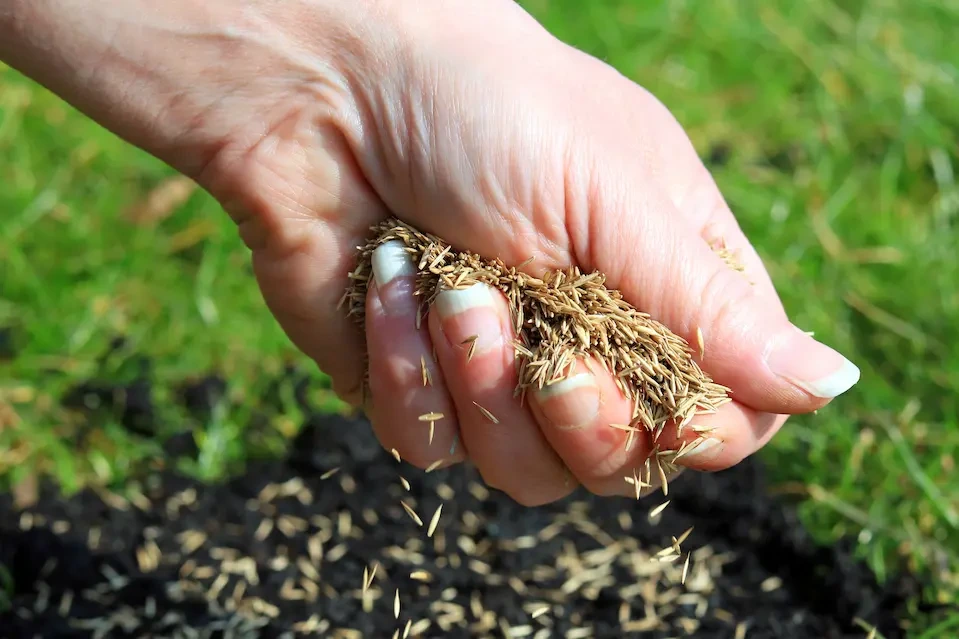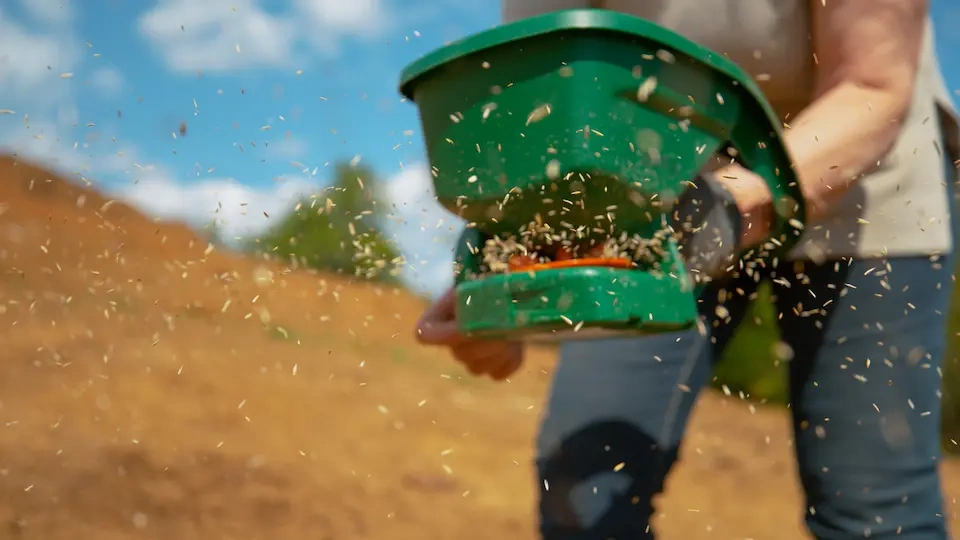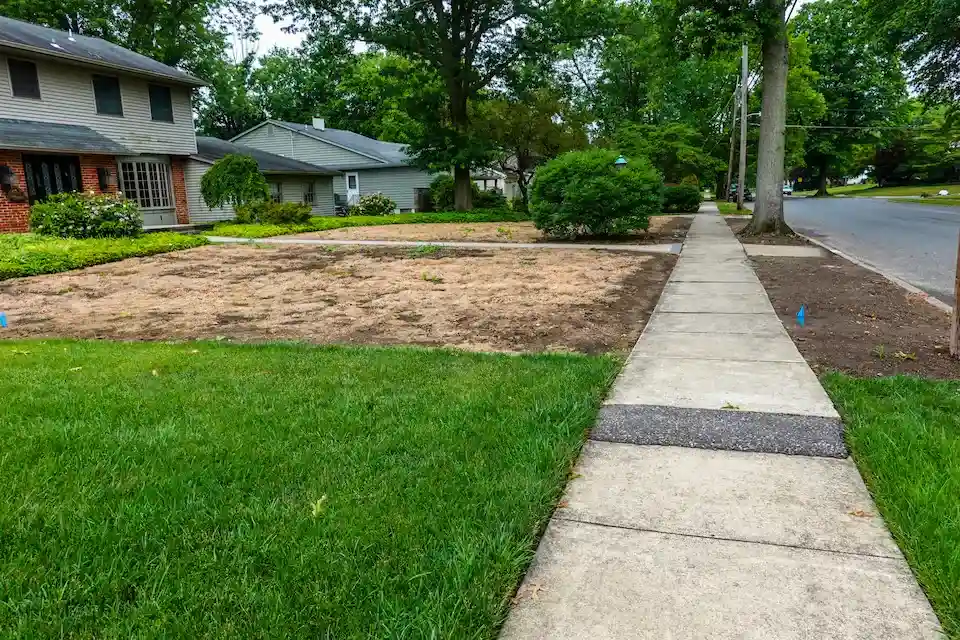A lush, vibrant lawn is not only a source of pride but also a welcoming haven for families and friends to enjoy the great outdoors. However, achieving that picturesque lawn in North Carolina comes with its unique set of challenges. The Tar Heel State boasts a diverse climate, from the coastal regions to the mountainous terrain, making the selection of the right grass seed crucial for a thriving lawn.

At FortSmith Landscaping, our Wake Forest landscaping experts understand the intricacies of North Carolina’s climate and soil conditions like no other. In this guide, we’ll walk you through the process of selecting the best grass seed for North Carolina, so you can transform your lawn into a verdant paradise perfectly suited to our state’s unique environment.
Understanding North Carolina’s Climate
North Carolina is a state of remarkable diversity when it comes to its climate. From the sun-soaked shores of the Outer Banks to the crisp air of the Appalachian Mountains, each region experiences distinct weather patterns throughout the year. This variation in climate has a significant impact on the type of grass that will thrive on your lawn.
Coastal Climate
The North Carolina coastal plain enjoys a humid subtropical climate. Summers are hot and humid, while winters tend to be mild. If you reside along the coast, you’ll want to choose grass varieties that can withstand the salt spray from the ocean and the occasional hurricane. Bermuda grass, known for its heat tolerance and salt resistance, is an excellent choice for coastal lawns.
Piedmont Climate
The Piedmont region, which includes Wake Forest and many other areas, experiences a transition between the coastal and mountain climates. Summers are warm, and winters can be cool, making it an ideal environment for both warm-season and cool-season grasses. This versatility allows homeowners in Wake Forest to select from a broader range of grass types for a healthy lawn.
Mountain Climate
In the western part of the state, the mountainous terrain brings cooler temperatures and more significant temperature variations. If you’re situated in the mountains, you’ll need to plant grass seed that can handle colder winters and shorter growing seasons. Kentucky Bluegrass and Fine Fescue are cool-season grasses that can thrive in the mountain climate.

Types of Grass Suitable for a Lush Lawn in North Carolina
Now that we’ve explored North Carolina’s diverse climate, let’s delve into the various grass types that are well-suited to this region. Understanding the characteristics of these grasses will help you make an informed choice for your new lawn.
Warm-Season Grass
Warm-season grasses are best known for their ability to thrive in the heat of summer, making them a popular choice for North Carolina lawns.
Here are some warm-season grasses to consider:
Bermuda Grass: Bermuda grassis a top choice for those growing grass for a lush, green lawn in the hot North Carolina summers. It’s known for its excellent heat tolerance and durability. This grass type requires full sun, making it perfect for areas with ample sunlight.
Zoysia Grass: Zoysia grass characteristics offers a balance between beauty and durability. It’s known for its dense, carpet-like appearance and resilience against pests and diseases. Zoysia can handle moderate shade, making it versatile for various lawn conditions.
Centipede Grass: Centipede grass is a low-maintenance option for North Carolina lawns. It thrives in acidic soils and requires infrequent mowing and fertilization compared to other high-maintenance grasses. Centipede grass is an excellent choice for those looking for an easy-to-care-for lawn.
Cool-Season Grass
Cool-season grass varieties are a suitable choice for areas in North Carolina that experience cooler winters and moderate temperatures during the growing season. Here are some cold-weather grasses to consider:
Fescue Grass: Fescue grass varieties, including Tall Fescue and Fine Fescue seed, are popular cool-season choices. They perform well in the mountain and Piedmont regions, offering excellent cold tolerance and year-round greenery.
Kentucky Bluegrass: Kentucky Bluegrass is known for its lush, dark green color and fine texture. While it requires more maintenance than some other cool season grasses, it can create a stunning lawn when properly cared for.
Perennial Ryegrass: When it comes to cool-season grasses, perennial ryegrass stands out as a versatile and popular choice for lawns. This grass species, known for its lush green appearance and rapid germination, offers a range of benefits that make it a top pick for many homeowners.

Assessing Your Lawn’s Specific Needs
Now that you’re familiar with the main grass types in North Carolina, it’s essential to assess your lawn’s specific needs.
Sun Exposure
Consider how much sunlight your lawn receives throughout the day. Different grass types have varying sunlight requirements:
Full Sun: Bermuda grass and Zoysia grass thrive in full sun conditions, receiving at least 6-8 hours of direct sunlight daily.
Partial Sun/Partial Shade: Centipede grass and some Fescue varieties can tolerate partial sun or light shade.
Soil Type
Understanding your soil type is crucial because it affects grass growth and nutrient absorption. North Carolina has a range of soil types, including clay, loam, and sandy soils. Conduct a soil test to determine your soil’s pH and nutrient levels. This information will help you select a grass type that matches your soil conditions.
Maintenance Preferences
Consider your willingness and ability to invest time and effort into lawn maintenance. Some grasses require more frequent mowing, fertilizing, and watering, while others are low-maintenance options. Choose a grass type that aligns with your desired level of lawn care.
Factors to Consider When Choosing Grass Seed
In addition to your lawn’s specific needs, several other factors should influence your grass seed selection. These factors will ensure that your chosen grass type not only survives but thrives in North Carolina’s climate.
Drought Tolerance
North Carolina experiences periods of drought, especially during the summer months. Select grass varieties with good drought tolerance to reduce the need for excessive watering. Bermuda grass and Zoysia grass are known for their drought resistance.
Disease Resistance
Some grass types are more resistant to common lawn diseases prevalent in North Carolina, such as brown patch and dollar spot. Research the disease resistance of the grass varieties you’re considering to minimize the risk of lawn issues.
Maintenance Requirements
Different grasses have varying maintenance requirements in terms of mowing height, fertilization frequency, and pest control. Choose a grass type that aligns with your maintenance preferences and schedule.
Grass Seed Blends and Mixtures
Grass seed blends and mixtures combine multiple grass varieties to create a more resilient lawn. They can offer benefits such as improved disease resistance, reduced maintenance, and enhanced aesthetics. Consider using a blend or mixture to create a well-rounded lawn.
Local Expertise from FortSmith Landscaping
At FortSmith Landscaping in Wake Forest, NC, we take pride in our deep understanding of North Carolina’s unique climate and the grass varieties that thrive here. Our team of experts is dedicated to helping homeowners like you make the best choices for their lawns.
Personalized Consultations
We offer personalized lawn consultations, where we assess your lawn’s specific needs and provide recommendations tailored to your location and preferences. Our goal is to create a customized lawn care plan that maximizes the beauty and health of your lawn.
Grass Seed Selection
With years of experience in Wake Forest and the surrounding areas, we can help you select the right grass seed for your lawn’s unique conditions. Whether you’re aiming for a drought-resistant lawn or a shade-tolerant one, we have the expertise to guide you.
Lawn Care Services
Beyond grass seed selection, FortSmith Landscaping provides a wide range of lawn care services to ensure your lawn remains healthy and vibrant. From regular maintenance to pest control and fertilization, we’ve got you covered.
Contact Our Wake Forest Landscaping Professionals Today
Choosing the right type of grass seed for your North Carolina lawn is a decision that can greatly impact the beauty and health of your outdoor space. Understanding your lawn’s specific needs, considering factors like climate and soil type, and seeking expert guidance can help you make an informed choice.
At FortSmith Landscaping in Wake Forest, NC, we’re here to assist you every step of the way. Our local expertise and personalized lawn care services are designed to transform your lawn into a vibrant, thriving oasis that you can be proud of.
Contact FortSmith Landscaping today for a personalized consultation, and start your journey toward a beautiful, thriving lawn. Get started by calling us at (919) 228-8495 or filling out the contact form to the right.
